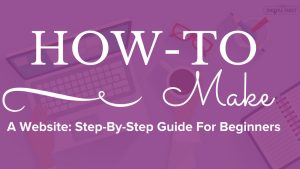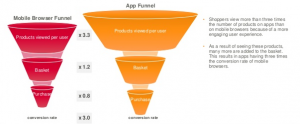
Okay so, it’s common knowledge that marketing technology is always changing. The thing is, this constant expansion in tech has implications on a marketer’s ability to keep up with it. Reading articles about what’s new isn’t good enough. Clients have questions, and the answers to them can’t rely on how exhaustive an article is.
Even if reading articles gave all the info about a new tool or app, imagine how much of a time investment would be required to read all the information and understand how to use it to benefit a client. How can you read about new technology, understand how it works, answer client questions, implement without disasters, and measure results?
Actually using new marketing technology is an efficient way to keep up. A lot of these tools require some social interaction and this can render sandboxes, or other test environments useless. For this reason and 15 others, I’m going to make the statement that every marketer should have their own live website.
1. It Can Improve a T-Shaped Skillset.
In a post from a few weeks ago, I discussed how being a t-shaped marketer is essential for agency success. The fact is, building a website will give you the ability to step in and help with some development if needed. Even if it’s something simple like changing or adding classes to elements.
That kind of exercise will become second nature if you’ve created a website.
2. Stress of the Unknown will be Diminished.
There are several times when stress is formed from a website concept that ends up not being that big of a deal. The ability to look at why a web page is misconfigured and know to jump into the browser’s developer tools (without freaking out) to inspect an element can pose more info to uncover the issue. Chances are it’s something small, like a sidebar image being too big.
3. Knowing How to Break Your Back-End will Boost DNS Confidence.
I’m not just talking about source code here. I’m talking about real nitty gritty back-end. If you get comfortable in the DNS of a website chances are you broke something at some point. I broke my email at least half a dozen times.
Knowing how this kind of protocol is handled, and what will break what is important as more and more marketing technology requires website verification. This is especially true with, but not limited to, email marketing technology.
Notice: ou really shouldn’t break a client’s website, but go ahead and break your own all you want.
4. Seeing the Entire Setup From the Ground Up Supplies Context for Marketing Activities.
This is especially beneficial for young marketers. If you can go from building a static HTML web page to a dynamic WordPress website you’re positioning yourself for huge growth. Setting up hosting, creating content, visual elements, etc. will help develope a timeline of what activities should happen and when.
Add in Google Tag Manager, then Google Analytics and some other Google tools and you’ve seen the process from development to marketing.
5. Understanding Website Migration Helps Frame the Concepts Behind Delicate Back-End Website Development.
This ties into numbers three and four pretty closely but I think it’s important enough to stand alone.
Do you add in Google Marketing Tools before or after you migrate from a dev environment to your live site? How does database management play into migrating a site?
Even with reading up on this, it is super common for something to break in a migration. Better to try this out on a personal website than a client’s the first, second, or even third time around.
6. It will Supply a Personalized Email Address.
By getting Google Apps for Business, you’ll have the added benefit of a personalized email address. Jackpot.
You can make your email signature be whatever you want. You might see that some social images look better than others, you’ll learn if you can add SVGs to Google to use in your signature or not.
7. It can Teach Lessons About How To Future Proof Early Stage Business Development.
With the steps that lead you to this point, you’ll know what to consider when deciding on early stage business development. Even what to name a company.
How will that company name translate to seamless digital experience? Is it going to be a weird domain name? Will it commonly get mistyped, misheard, or will it be forgettable? Will it make for long email addresses that are cumbersome to type?
8. There will be Countless Opportunities to Master Several Free Tools.
Between Google Apps for Business, Google Marketing Tools, and marketing tools that have free lightweight licenses, you’re going to get exposure to countless free solutions for common tasks.
This will make you crazy smart, issues that have been driving your employer, or client, insane will seem to be solved effortlessly by you. Now you’re a gem who can understand and solve key pain points.
9. They can Become a Skilled Google Apps Administrator.
Charging forward with your own Google Apps for Business account has a ton of added benefit. Marketers will learn how to set up the DNS, sure, but you’ll also uncover strategic Google Drive construction.
Knowing what the folder hierarchy should look like will become apparent if you use your drive and free tools together. By playing around with the library of tools available to you you’ll be well versed in what tools are available to make work easier or more efficient.
10. Learn the Art of Truly Being Digitally Organized.
Okay, the steps mentioned above go into breaking your website and leveraging Google Apps for Business. An invaluable lesson marketers can walk away with is a very real understanding of being organized.
I’m not just saying that it’s a big deal, everyone knows that. But how an individual marketer should organize their assets will become significant to them. Between building a website, crashing it and having to rebuild, a strategy of asset management will become rock solid.
More importantly, it will be a strategy that they are confident works for them. Personalized expertise is something that’s profoundly respectable.
11. Develop a Unique Sort of Playground for Growth and Experimentation.
If all the steps leading to this point have been mastered, there’s a specific sense of pride and ownership felt towards a website. It was intentionally designed and implemented. Several of lessons have been learned and the result is defined communication between departments.
Now to experiment with some new tools. This is how marketing technology is learned and understood.
“I know how that works, I’ve used it on my site” is way better than “I know how that works, I read about it in an article”.
12. Growth will Extend Beyond Knowing how Something Works.
There will be a point where all the free tools, cool browser extensions, and Google Apps become less overwhelming. This is an exciting milestone to achieve. At this point, you’ll understand what different metrics mean from different tools. From here, you can align what’s important to you to what’s being presented by different tools.
You’re going to start removing tools that aren’t relevant to your efforts. You know what they do, that’s good enough. You can apply them to a situation that’s appropriate by knowing when someone expresses a pain point that they’ll solve.
From here, you will know enough about what’s available that you might even consider buying premium versions of tools you like.
Basically, you’ve developed a palette for tools that fit your needs. You’re becoming a seasoned marketing technology connoisseur.
13. Gaining Backlinks will Become Less Nebulous.
Getting backlinks can be so challenging! It can also be a hard concept to communicate with clients.
While staring at a low domain authority in your MozBar there will be an inevitable drive to boost it. How do you achieve that? With quality content, that’s updated regularly, and backlinks.
Understanding how to build backlinks is something that people will seriously thank you for later.
14. Becoming Empathetic to Client Concerns will Happen Effortlessly.
You’ve designed a static HTML web page, converting it into a dynamic website, migrated it from a dev environment to a live site, created an organized content calendar with your Google Apps, made email addresses, etc. You went from no domain authority to some by blogging, gaining backlinks, getting syndicated, establishing a social presence, etc.
This is a pretty big moment in your marketing technology growth. At this point, you’ll be a guide to your clients. You’ve been through what they’re going through. You even used tools you ended up not liking, tools they might need! In spite of your personal preference, you are enabled to help them achieve their goals with whatever technology they need by knowing how to pair their needs with solutions.
15. Become Powerfully Marketable.
Plain and simple, if you’ve done everything leading to this point, you will be able to get a job or clients, and people will follow you. I’m not talking about following you on Twitter, however, they probably will, I mean they will literally follow you. From employer to employer, or employer to free agent.
Being a strong marketer requires a deep understanding of new technology and experience with various strategies. Developing your own website will put you in an interesting position to grow autonomously with plenty of room to make mistakes along the way.
Learn from those mistakes and experiences and be ready to give incredible marketing help to clients in need.
Digital & Social Articles on Business 2 Community(80)
Report Post




